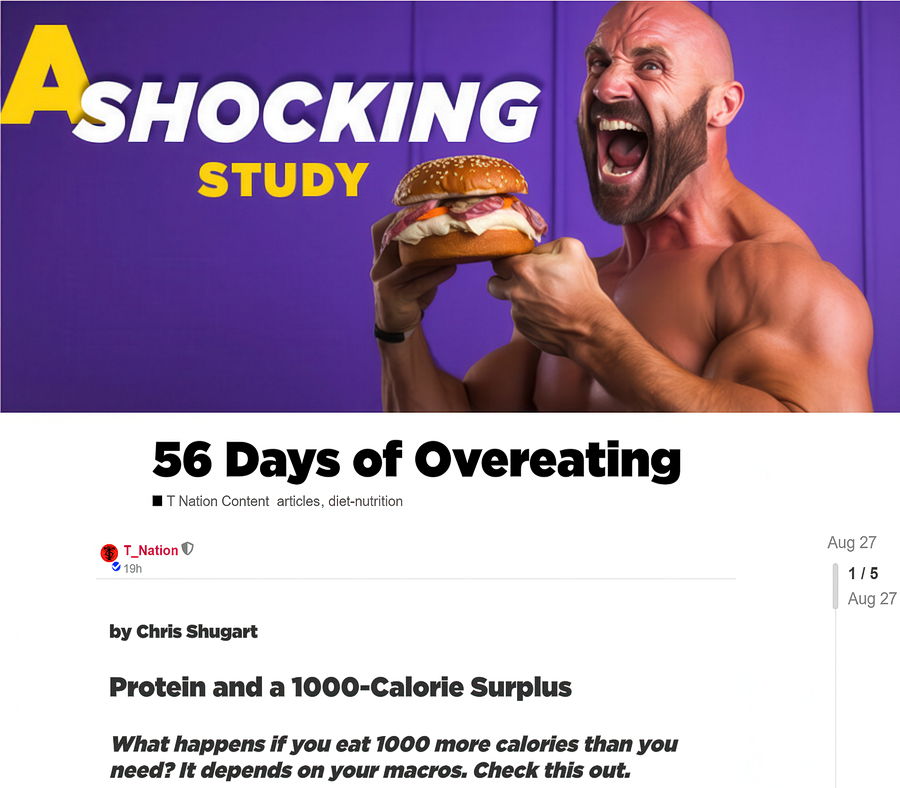The protein guy and salesman Chris Shugart over at the supplement and fitness website T-Nation recently dug out an old study from 2012 on overeating (although the data collection took place during 2005 to 2007,) and the effects of a high intake of protein. As I worked for almost 30 years in this industry, let’s take a look at it and what Chris did draw from it.
“You’ll definitely gain weight if you eat 1000 extra calories every day for weeks. But does the macronutrient composition of those calories matter? Is a “calorie a calorie” or does the source matter? What if most of those surplus calories came from protein? How does that affect body composition?”
Yes, if you suddenly increase your energy intake drastically, you’ll gain weight. However, as your body only recognizes nutrients, increasing your intake of protein or animal fats will have a much larger impact on muscle mass and very little on fat mass, while increasing or keeping carbohydrates high, which is a potent poison and must be neutralized and/or stored away, will accelerate fat storage, leading to weight gain of mostly fat.
As for calories, these are a measurement of heat within the realm of physics, as derived from burning something and raising the temperature of water by 1°C (1.8°F.) Your body does not work that way, we do not consume food to heat water in our bodies. And our bodies do not use heat as energy in its metabolic processes, but rather chemical energy. So using “calories” as a measurement of energy in food is simply retarded. I’ve covered this many times.
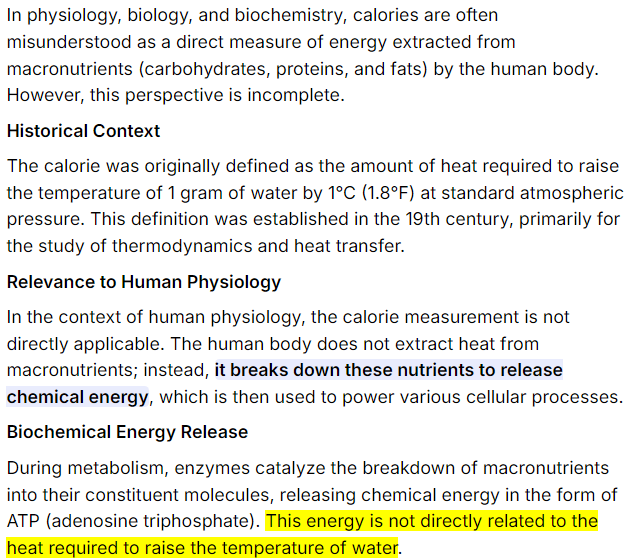

“Wow, that’s a lot of questions. Luckily, some scientists answered them all. This study was insane. Every subject lived in the metabolic research facility for three months. Every meal eaten was precisely prepared and every bite was accounted for.”
Questions that are easily answered without the need of any study if you understand human physiology, biology, and biochemistry. It’s all common sense really.
With that said, bring it on.
The Overfeeding Study
“Researchers recruited 16 men and 9 women, all healthy but sedentary. First, they put the subjects into a metabolic chamber to determine their maintenance calorie intake. Then they all lived in the lab for a few weeks eating a weight-stabilizing diet.”
Healthy by what standards? 99% of all people today are unhealthy, as they do not follow our natural human and species-specific carnivorous diet.
And again, calories are pseudo-science. Let’s just say it as it is, the participants were fed more food than previously as measured by a faulty standard. Still, as they counted macronutrients in grams, we can extract some relevant data.
And as for “metabolic chambers,” they’re, well, crappy at best. In “direct calorimetry,“ the subject is placed in a sealed chamber filled with a known volume of water. The body’s heat production is absorbed by the water, causing a change in its temperature. The heat loss from the subject is measured, and energy expenditure is calculated based on the heat transfer. In “indirect calorimetry,” they measure the amounts of oxygen (O2) and carbon dioxide (CO2) produced during metabolism of the subject.
Again, since calories are used, which is flawed, the result is also flawed. To add to this, indirect calorimetry relies on assumptions about the body’s metabolic pathways and the stoichiometry of energy production, using “standardized” mathematical formulas.

“Now the fun begins. Subjects were divided into three groups. All three groups were overfed by 1000 calories a day, about a 40% surplus:
Low Protein Group
Protein: 5%
Carbs: 40%
Fat: 55%Normal Protein Group
Protein: 15%
Carbs: 40%
Fat: 45%High Protein Group
Protein: 25%
Carbs: 40%
Fat: 35%”
Do you see the big problem here? Yes, none of the groups were fed a proper human and species-specific diet, as in a ketogenic diet based on animal foods; as in animal fats and protein only without any useless and toxic carbohydrates.
Instead, all three groups were fed damaging carbohydrates. Solely from this, we can immediately expect to see body fat gain in all three groups from the body being forced to store some of the excessive amounts of blood glucose and toxins as body fat to protect its blood vessels, nerves, organs, and soft tissues. The high protein group should expect to regain some previously lost muscle mass, even if sedentary, simply from the activation of protein synthesis. And the low protein group should expect a large fat gain and likely some muscle loss, especially at only 5% protein, which would be in the neighborhood of 40 grams a day, about half of what you need to maintain a “normal amount” of muscle mass, and a third of what is healthy. Poor suckers.
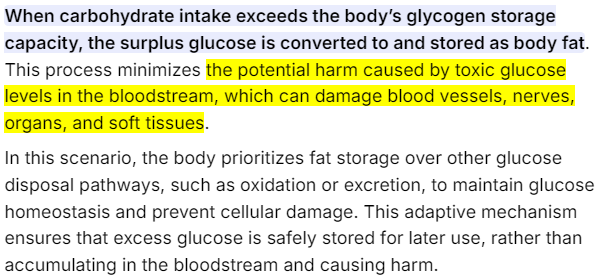
Also, it should be noted that this study was conducted between June 2005 and October 2007, which may reflect the technology used.
And as a second note, after the “metabolic chamber” each participant was put on a “weight maintenance diet” over 13 to 25 days while consuming an isocaloric diet with 15% of energy from protein, 25% from fat, and 60% from carbohydrates, before beginning the overeating phase. In other words, an extremely unhealthy and damaging diet, very high in toxic carbohydrates. But that switch would really favor a higher protein intake.
“They all consumed the same high number of calories, but some ate more fat and less protein. Others ate more protein and less fat. Carbs were the same in all groups. Here’s how the protein looked:
Low Protein Group: 45 grams
Normal Protein Group: 140 grams
High Protein Group: 230 grams”
That was the averages, as each participant had a unique body composition and energy requirement. As a note, the low-protein group consumed between 42.7 to 50.5 grams/day of protein, the middle group consumed 117 to 162 grams/day, and the high-protein group consumed between 188 to 268 grams/day.
In other words, the high-protein group was more in line with what we would see on a normal and natural diet consisting of only animal protein and animal fat.
What Happened After 56 Days of Overfeeding?
- “Everyone gained about 7 pounds of fat.
56 days? Let’s say “eight weeks” as a normal person. And as I predicted, they gained body fat. Again, this is because they all consumed toxic and completely unnecessary carbohydrates. Idiotic.
- The normal and high-protein group gained about 6.5 pounds of lean body mass, but the low-protein group lost 1 pound of lean body mass.
Again, as predicted for both groups. In the high-protein group, the sudden surplus of protein, as in amino acids, stimulated their protein synthesis, restoring some previously lost muscle mass due to their bad diets and sedentary lifestyle.
And the low-protein group did not meet their protein requirements, so some of their muscle mass was recycled to keep up with repairing all the damage the diet did — even though their energy intake was excessive. This phenomenon is well-established within physiology. And that fact proves that the diet was toxic, likely due to consuming carbohydrates and some plant-based and processed foods.


- So, the low-protein group gained less overall weight (7 pounds), but it was all fat! The normal protein group gained more total body weight, as did the high-protein group (13-14 pounds), but the extra weight they gained on top of their fat gain was all lean body mass (6.5 pounds).
Yes, and just imagined what would have happened if they would have had three zero-carb groups. There would have been minimal fat gain and about the same muscle gain. Also, they would actually have healed some previous damage and become healthier. But who cares about that, right?
- The normal and high protein groups increased their metabolisms by over 20%. The low-protein group boosted their metabolism by only 2% which the researchers called “statistically insignificant.”
Yes, due to the increase in muscle protein synthesis, and also by the stress on the body by consuming a lot more food, of which most of it was toxic. That is not a good way to increase your metabolism as your body is fighting for survival, trying to lower blood sugar all day long. Idiotic!
Wait! They Gained Muscle Without Lifting?
“Yep, that’s what happened with the high-protein eaters. Other studies showed this too. When even a sedentary person increases their protein intake, they gain some muscle. Dr. Campbell adds, “For many years I believed you couldn’t gain lean body mass without lifting weights. I believed that you couldn’t gain muscle by just eating more protein. I was wrong.”
I explained this above. And Dr. Campbell is obviously an idiot. This is simple physiology.
With that said, they will only re-gain muscle mass they have lost and to a degree that was within their natural set-point, whenever that was. I.e. the amount of muscle mass that the body was previously accustomed to without the building effect of muscle stimulus. And therefore, they will not continue to build muscle past that limit, as that requires muscle stimulus, as in doing actual physical work, as for example lifting weights or doing heavy labor.

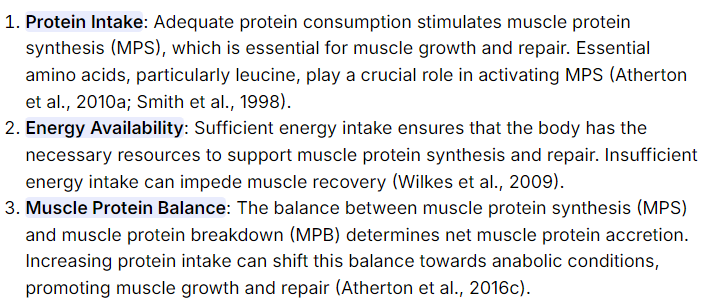

How to Use This Info
“The subjects who ate higher-protein diets will have a much easier time losing the 7 pounds of fat they gained. The addition of resistance training would’ve made this study more interesting, but we could guess that lifters would’ve gained more muscle and maybe less fat.”
Yes, resistance training would have used up some of the toxic blood glucose from consuming carbohydrates, leaving the body with a little less glucose to store away as glycogen and fat tissue in order to protect the body from further damage.
“For us, this study is a reminder to eat plenty of protein. The subjects were sedentary with an average body weight of 165 pounds, yet some consumed up to 230 grams daily. You may not need that much, but at least follow the Golden Rule for lifters: eat roughly 1 gram of protein per pound of body weight (assuming you’re not a fat lifter).”
While protein is an important macronutrient, so is animal fats and every essential nutrient. And those can only be found in fully bioavailable form within animal foods. And if you adopt our natural animal-based human diet, which should be at least 80% carnivorous, preferably fully carnivorous as we humans are obligate hyper carnivores, it’s impossible to consume too little protein. Every nutrient you need will be fully available. You only need to fine-tune your fat intake depending on your activity levels and goals. Protein will usually take care of itself.

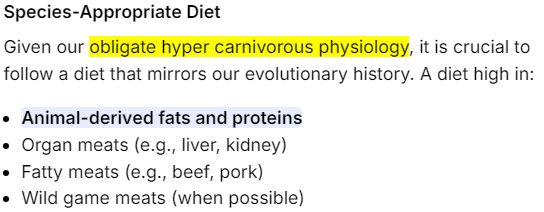
“If you’re in a mass phase, shift those surplus calories to mostly protein instead of carbs and fats. You’ll build more muscle and keep your metabolic rate (total daily energy expenditure) fired up.”
Sure, but you will rarely need more than about 2,2 to 2,6 grams of protein per kilogram of bodyweight, or 1 to 1.2 grams per pound of body weight. Not unless you take anabolic-androgenic steroids and/or SARMS — then you can double that.
And you do not need carbohydrates. They will damage your body. If you’re a professional bodybuilder and need a shit-ton of energy, you might have some before your workouts, so you use up that excessive blood glucose as energy, thus limiting the damage. But never consume carbohydrates at any other time of the day. The damage will accumulate and strip years of your life, not to mention the damage done to your blood vessels, nerves, organs, and soft tissues.
And if you take performance enhancing drugs, your cardiovascular system will be under stress from that also, increasing the damage manifold.


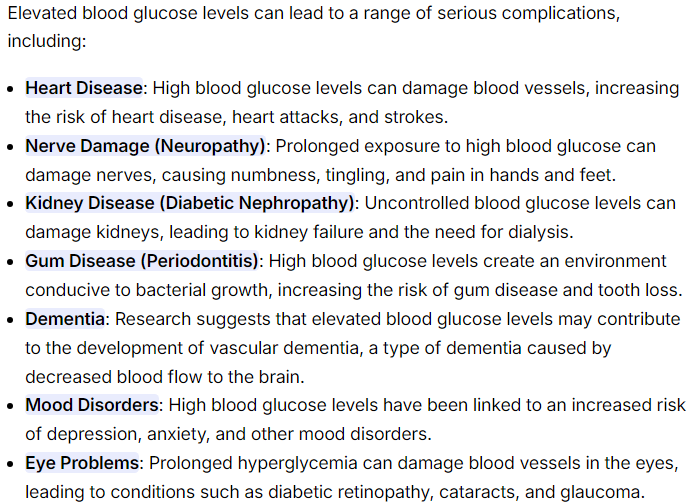
And with that, Chris ended with plugging their protein powders. What a shocker.
Again, no need for supplements if you follow our natural human carnivorous diet, as it will provide all the nutrients you’ll ever need, including a lot of protein. If you lift weights, meat and eggs is all you need — and perhaps some dairy if you want to gain weight quickly.
If you need help with gaining or losing weight, with your health, nutrition, and/or transitioning from your current way of eating to our natural species-appropriate, species-specific way of eating, I’m available for both coaching and consultation.
And if you found the article and my insights helpful and enjoy my free information, please consider donating to help pay the webhosting bills and keep the site running. And if you’re interested in discussing and sharing information with likeminded people, consider joining our uncensored community at Ungovernable.se. Thank you!


